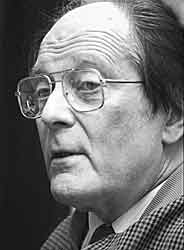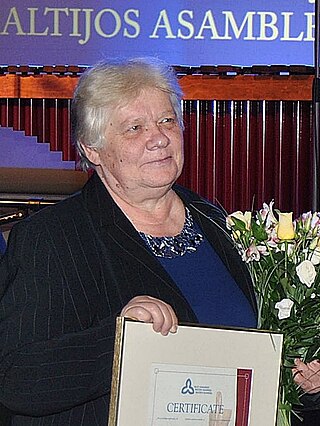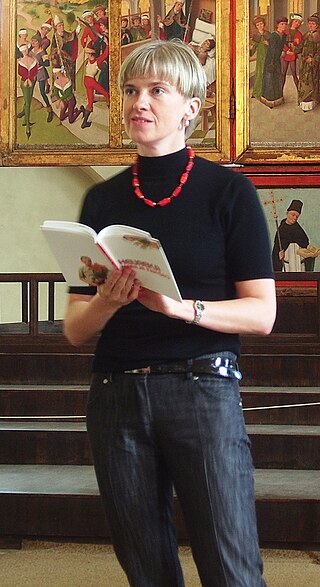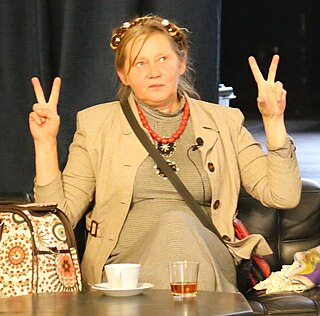
Jaan Kross was an Estonian writer. He won the 1995 International Nonino Prize in Italy.
Sudanese literature consists of both oral as well as written works of fiction and nonfiction that were created during the cultural history of today's Republic of the Sudan. This includes the territory of what was once Anglo-Egyptian Sudan, the independent country's history since 1956 as well as its changing geographical scope in the 21st century.

Ene Mihkelson was an Estonian writer. She was a recipient of the Herder Prize and the Baltic Assembly Prize for Literature.

Jaak Urmet is an Estonian writer.
Estonian literature is literature written in the Estonian language The domination of Estonia after the Northern Crusades, from the 13th century to 1918 by Germany, Sweden, and Russia resulted in few early written literary works in the Estonian language. The oldest records of written Estonian date from the 13th century. Originates Livoniae in Chronicle of Henry of Livonia contains Estonian place names, words and fragments of sentences. The Liber Census Daniae (1241) contains Estonian place and family names. The earliest extant samples of connected Estonian are the so-called Kullamaa prayers dating from 1524 and 1528. The first known printed book is a bilingual German-Estonian translation of the Lutheran catechism by S.Wanradt and J. Koell (1535). For the use of priests an Estonian grammar was printed in German in 1637. The New Testament was translated into southern Estonian in 1686. The two dialects were united by Anton Thor Helle in a form based on northern Estonian. Writings in Estonian became more significant in the 19th century during the Estophile Enlightenment Period (1750–1840).
Mare Kandre was a Swedish writer of Estonian descent. She was born, in Söderala, a small place in mid-Sweden and grew up in Gothenburg and Stockholm. Between 1967 and 1969, she lived with her family in British Columbia, Canada, a period which made a very deep impression on her and later in life influenced her writing. She died of an unintentional prescription drug overdose, aged 42.

Vahur Afanasjev was an Estonian novelist, poet, musician and film director best known for his novel Serafima and Bogdan a story following the lives in a village of Russian Orthodox Old Believers on the shore of the lake Peipus from the end of the World War II to the nineties. The novel won the 2017 Estonian Writers' Union's Novel Competition.

Mait Metsanurk was an Estonian writer who led the neo-realist school of Estonian literature.

Maarja Kangro is an Estonian poet, short story writer, novelist, essayist, nonfiction writer and librettist.
Mait is an Estonian masculine given name.

Rein Raud is an Estonian academic and author.

Asko Künnap is an Estonian designer, writer, and artist.
Kamran Nazirli is an Azerbaijani writer, dramatist and translator. He is a member of the Azerbaijani and Belarus Writers' Union and Journalists' Union of Azerbaijan. He was awarded with the Prize of H.B. Zardabi, the founder of the Azerbaijani National Press, Rasul Rza Prize for literature.

Kalle Kurg is an Estonian poet, writer, critic, translator and editor. As a versatile figure in Estonian culture, he has also published caricatures and worked as a theatre director.

Merle Jääger is an Estonian television, stage and film actress, poet and author who frequently uses the pen name Merca. Initially associated with the burgeoning Estonian punk rock scene of the early to mid 1980s, she has been described as the "bard of protest". Her career as an actress began in her early 20s and she has received a number of high-profile awards for stage roles.

Lehte Hainsalu is an Estonian writer, poet and politician.

Jaan Undusk is an Estonian writer, playwright and literary scholar.

Toomas Vint is an Estonian painter and writer.
Jüri Tuulik was an Estonian writer and playwright.
Tõnis Tootsen is an Estonian poet, prose writer and novelist. He mainly writes in the genres of science fiction and fantasy.













